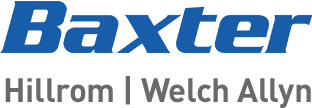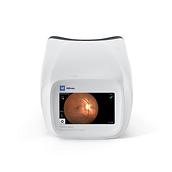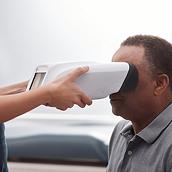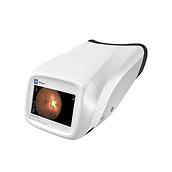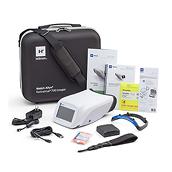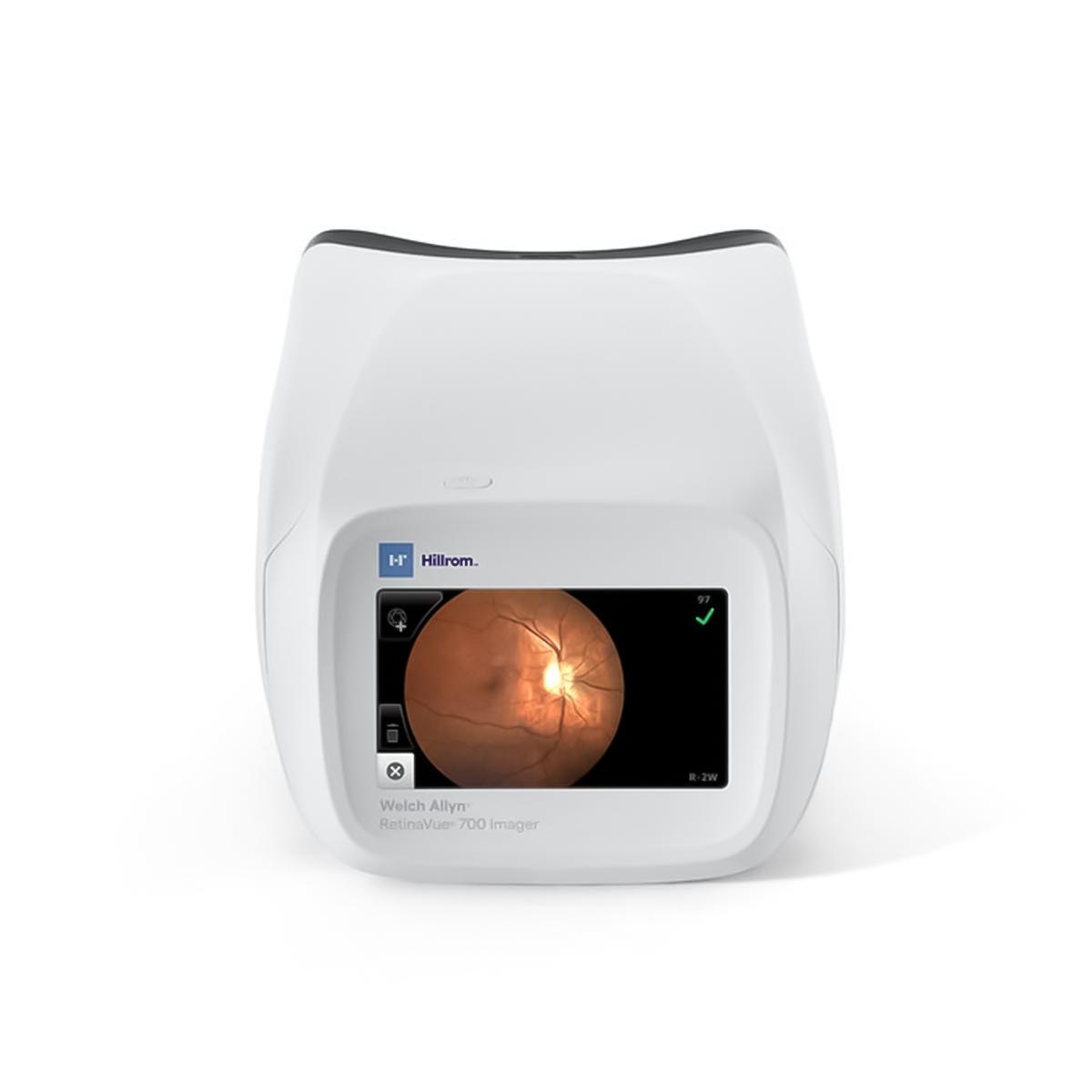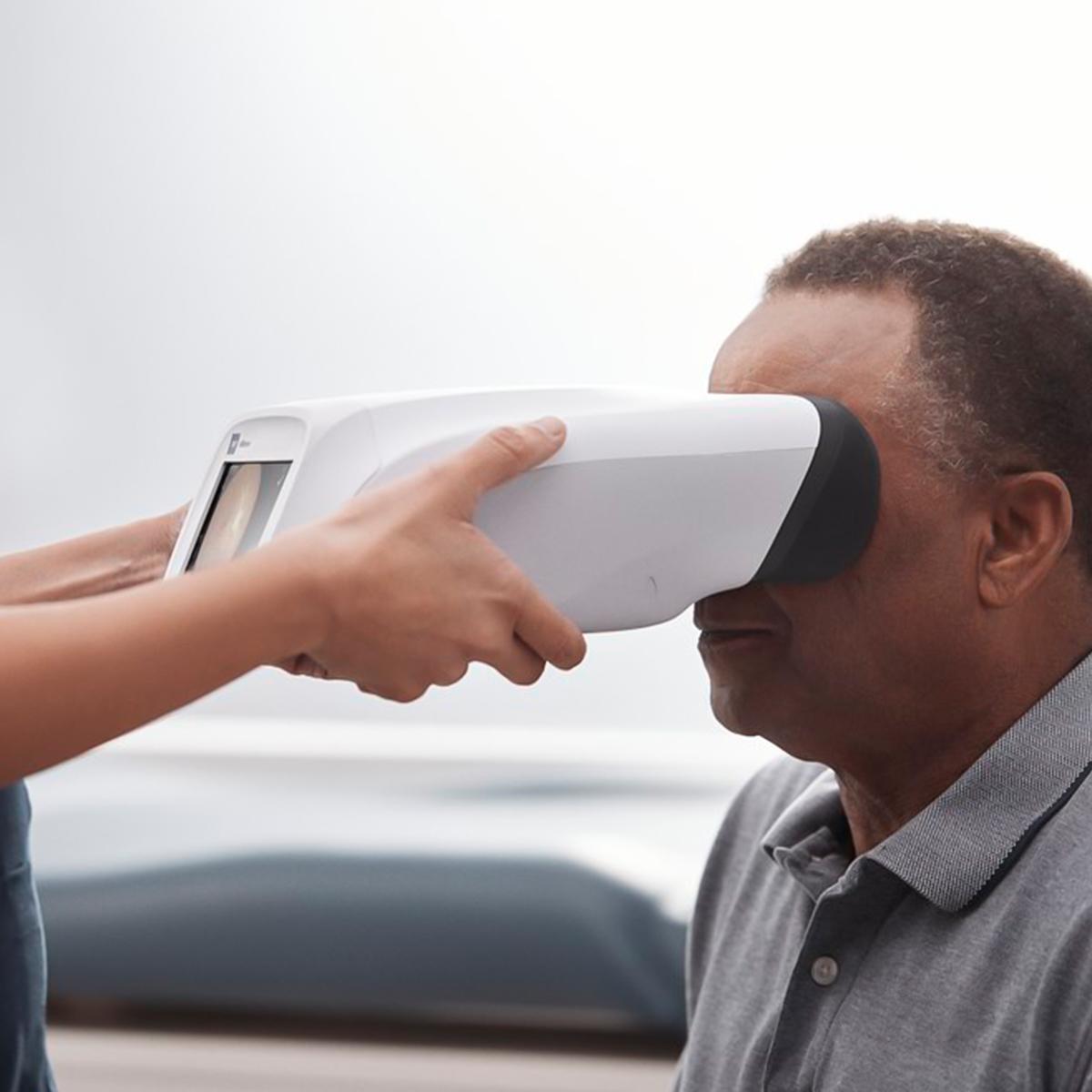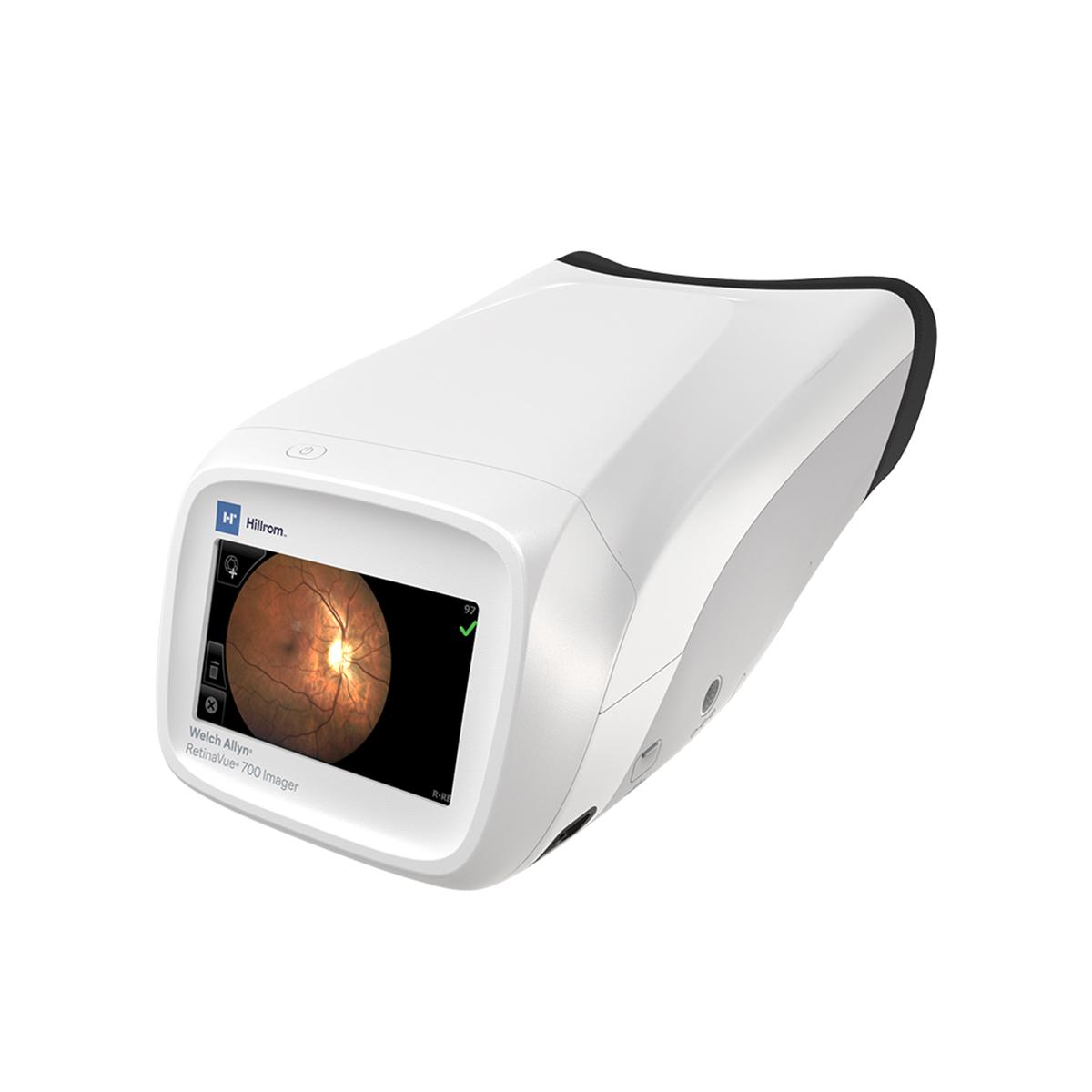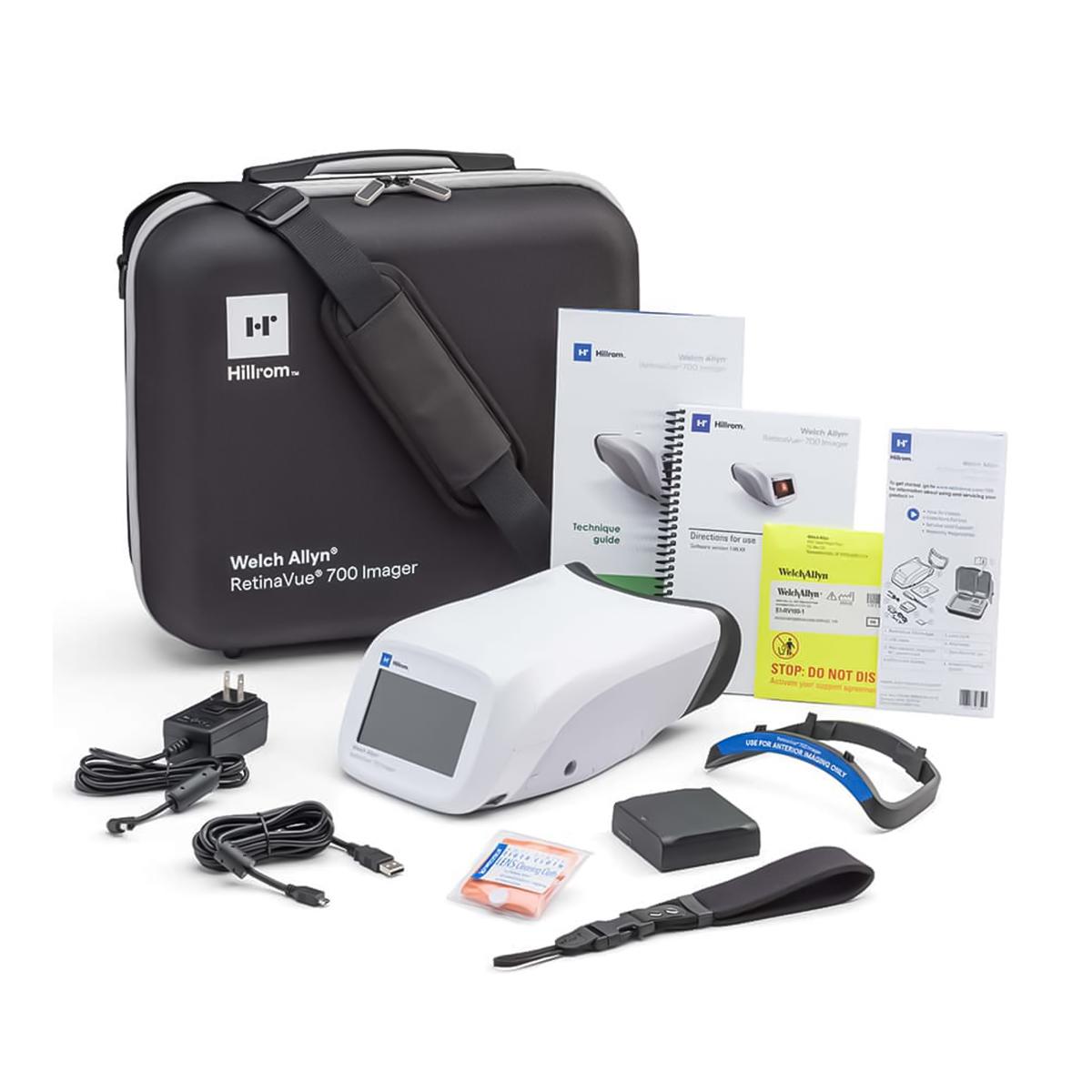Features
- 2.5 mm small pupil capability requires little to no chemical dilation (see directions for use)
- 60º wide field of view
- Meets ISO 10940 optical standard for ophthalmic instruments
- RetinaVue Network software is hosted on the Microsoft® Azure™ cloud

Easy to Use
Effective
Flexible
Secure

Seamless Workflow
Place retinal exam orders and automatically access diagnostic reports from your EMR. We offer wireless connectivity and fully integrated, bi-directional interfaces with EMRs including Allscripts®, athenahealth®, Cerner®, Epic®, NextGen® and many others to help you streamline procedures.
Watch Monica's Story
Meet the RetinaVue 700 Imager
Education & Documentation
Get in the know to get the most value out of your solution.
RetinaVue 700 Imager User's Guide
Product Documentation
-
Comparison Sheet
keyboard_arrow_downRetinaVue 100 vs RetinaVue 700
-
Installation Guide
keyboard_arrow_downRetinaVue Network Software Application, Installation Guide
Frequently Asked Questions
Expand all-
How much training is required to become proficient with the RetinaVue 700 Imager?
keyboard_arrow_downThe RetinaVue 700 Imager is easy to use, with groundbreaking automated retina imaging technology, including auto-alignment, auto-focus and auto-capture. So while little training is required to successfully operate it, you will receive a free 1.5-hour webinar training and several training documents and videos to make learning to use the RetinaVue 700 Imager as smooth as possible. -
What is the difference between the RetinaVue 700 Imager and the 100 Imager?
keyboard_arrow_downThey are both part of the RetinaVue care delivery model, making for simple, comfortable diabetic retinal exams in primary care. And while both imagers feature breakthrough technology with auto-focus and auto-capture, the RetinaVue 700 Imager makes this easier with auto-alignment, able to capture both eyes without repositioning. Plus, the RetinaVue 700 Imager raises the bar with a 60° field of view as opposed to the 45° field of the 100. The RetinaVue 700 Imager also has an even smaller pupil capability at 2.5 mm (see Directions for Use) that requires little to no chemical dilation compared to the 3 mm of the RetinaVue 100 Imager. -
Is RetinaVue Network software included with the RetinaVue 700 Imager?
keyboard_arrow_downDesigned to work exclusively with the RetinaVue Network software, a subscription is required and priced per camera, per month. HIPAA-compliant and FDA-cleared, this software enables you to easily transmit encrypted retinal images to your preferred ophthalmic specialist and manage population health data on retinal exams by clinic and patient. Subscriptions include fully integrated, bi-directional interfaces with EMRs to streamline documentation. -
Should I connect the RetinaVue 700 Imager via USB cable or wireless?
keyboard_arrow_downThe RetinaVue 700 Imager includes built-in wireless capabilities for seamless EMR connectivity and web-based control without the need for PC software or cables. A wireless workflow is ideal for:
- Optimizing your current workflow with EMR connectivity
- Using one camera across multiple clinics
- Performing exams in multiple states or in mobile environments
-
Does the RetinaVue 700 Imager connect to EMRs?
keyboard_arrow_downYes, RetinaVue Network offers fully integrated, bi-directional interfaces with EMRs including Allscripts, athenahealth, Cerner, Epic, NextGen and many others. Place exam orders and automatically access diagnostic reports from your EMR. -
How does the image quality compare to tabletop retinal cameras?
keyboard_arrow_downLike most tabletop retinal cameras, the RetinaVue 700 Imager is capable of high-resolution (2592 x 1944 pixels) image capture, has a wide 60° field of view, 2.5 mm small-pupil capability (see directions for use) and meets the International Organization for Standardization optical standard that specifies requirements and test methods for fundus cameras—ISO 10940. -
What is the payback period for the RetinaVue fundus imaging equipment?
keyboard_arrow_downWhen purchased outright (as opposed to a lease), the payback period is approximately 200 exams. -
How often do patients need to be dilated for a RetinaVue Imager exam?
keyboard_arrow_downLittle to no chemical dilation is needed with the RetinaVue 700 Imager. Older patients, those with cataracts, or patients under certain medications may require a mild dilating drop (0.5% tropicamide). -
Can the RetinaVue 700 capture anterior images?
keyboard_arrow_downYes, thanks to the RetinaVue 700 Imager’s spacer attachment. -
Can our preferred, local eye specialist interpret the retinal images from our clinic?
keyboard_arrow_downYes, you can contract with your preferred eye specialist. Alternatively, state-licensed, board-certified ophthalmologists and retina specialists at RetinaVue, P.C., can interpret the retinal images and prepare a comprehensive diagnostic report and referral/care plan generally in one business day—complete with ICD codes, signature and license number. RetinaVue, P.C., is the first tele-ophthalmology provider to earn The Joint Commission’s Gold Seal of Approval® by demonstrating continuous compliance with the Commission’s Ambulatory Care Accreditation Standards. Professional medical services provided by RetinaVue, P.C., are priced on a per-exam basis. -
What is the RetinaVue care delivery model capable of finding?
keyboard_arrow_downWhile the exam is performed to detect and stratify the severity of diabetic retinopathy at its earliest stages, RetinaVue, P.C. retinal specialists often detect symptoms of other systemic diseases, including papilledema, macular degeneration, age-related macular degeneration, glaucoma and even certain types of cancer and stroke. -
Are RetinaVue Imager retinal assessments reimbursed?
keyboard_arrow_downFour of the top five commercial health insurance plans reimburse exam costs when provided through the RetinaVue care delivery model. Average reimbursement is approximately $75 per exam. Check with your health plans to determine coverage and reimbursement levels, or contact one of our specialists who can assist you in this process.
-
Does a RetinaVue Imager retinal assessment meet the HEDIS requirement for a diabetic eye exam?
keyboard_arrow_downAbsolutely. The National Committee for Quality Assurance, which administers the HEDIS measure for diabetic eye exams, has validated that a RetinaVue Imager retinal exam satisfies the HEDIS measure. -
Does a RetinaVue Imager retinal assessment replace an annual eye exam?
keyboard_arrow_downNo. This exam, reviewed by retinal specialists, only detects diseases that manifest in the area of the retina imaged by the retinal camera, such as diabetic retinopathy. The RetinaVue care delivery model is not meant to be used as a replacement for a comprehensive eye exam, but rather to improve compliance for diabetic patients who are non-compliant with an annual retinal eye exam to detect retinopathy.
